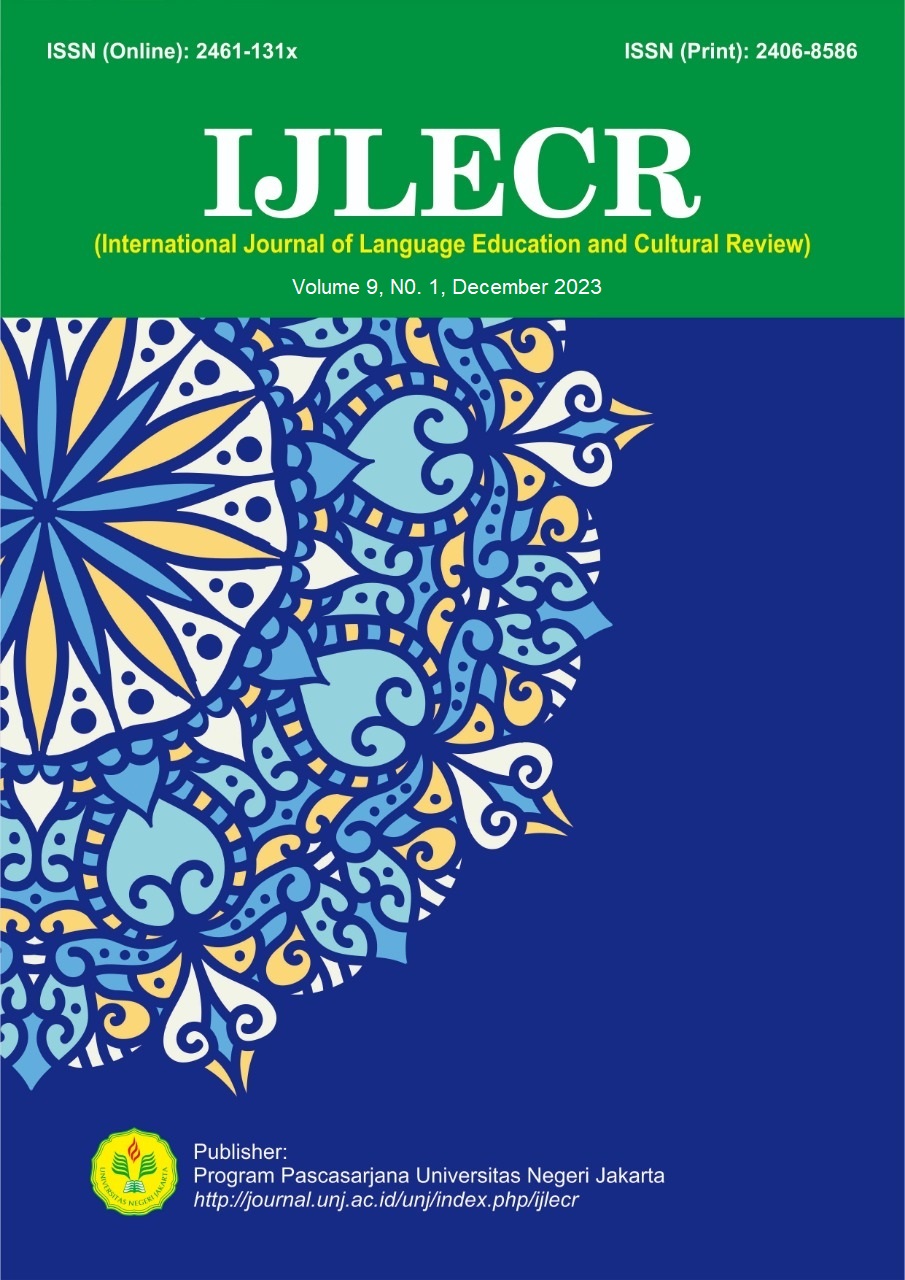Language Assessment Literacy: Cases of Pre-Service English Teachers
DOI:
https://doi.org/10.21009/ijlecr.v9i1.33032Keywords:
language assessment literacy, English language teaching, pre-service teachersAbstract
Language assessment literacy is a key area for researchers or anyone with an interest in improving the quality of teaching. A good understanding of the development of assessment instruments is very important in the learning process. The aims of the study are to analyze to what extent of pre-service English teachers are academically and professionally prepared to carry out tasks related to assessing students' language skills and to analyze to what extent and how pre-service English teachers perceive language assessment literacy in their teaching practice. This study uses a qualitative method in which interviews are used to collect data. Interviews were conducted with to 20 pre-service English teachers from the Jenderal Soedirman University, English Education Department. The interview questions were developed to incorporate the eight dimensions of language assessment literacy. The results of the study show that academic experience in terms of attending formal education and professional training is very necessary for pre-service teachers. In addition, it is important for prospective English teachers to understand not only the concept of assessment in the teaching process, but understanding the skills to achieve learning objectives through an assessment process using technology.
References
Baker, B.A., & Riches, C. (2018). The development of EFL examinations in Haiti: Collaboration and language assessment literacy development. Language Testing, 35(4), 557-581, https://doi.org/10.1177/0265532217716732
Brookhart, S. (2011). Educational assessment know-ledge and skills for teachers. Educational Measure¬ment: Issues and Practice, 30(1), 3-12. https://doi.org/10.1111/j.1745-3992.2010.00195.x
Coombe, C., Vafadar, H., & Mohebbi, H. (2020). Language assessment literacy: what do we need to learn, unlearn, and relearn? Language Testing in Asia, 10(1). https://doi.org/10.1186/s40468-020-00101-6
Crusana, D., Plakans, L., & Gebril, A. (2016). Writing assessment literacy: surveying second language teachers’ knowledge, beliefs, and practices. Assessing Writing, 28, 43–56. https://doi.org/10.1016/j.asw.2016.03.001
Davies, A. (2008). Textbook trends in teaching language testing. Language Testing, 25(3), 327–347 https://doi.org/10.1177/0265532208090156
Ekawati, A. D., Lustyantie, N., & Chaeruman, U. A. (2022). Students’ perception on learning heutagogy in the English for young learner. Ijlecr - International Journal of Language Education and Culture Review, 8(1), 1-8. https://doi.org/10.21009/IJLECR.081.01
Fulcher, G. (2012). Assessment literacy for the language classroom. Language Assessment Quarterly, 9(2), 113–132 https://doi.org/10.1080/15434303.2011.642041
Giraldo, F. (2018). Language Assessment Literacy: Implications for Language Teachers. Profile: Issues in Teachers’ Professional Development, 20(1), 179-195. https://doi.org/10.15446/profile.v20n1.62089
Giraldo, F. (2021). A reflection on initiatives for teachers’ professional development through language assessment literacy. Profile: Issues in Teachers’ Professional Development, 23(1), 197– 213. https://doi.org/10.15446/profile.v23n1.83094
Hay, P., & Penney, D. (2013). Assessment in physical education: A sociocultural perspective. London: Routledge.
Herrera, L., & Macías, D. (2015). A call for language assess¬ment literacy in the education and development of Teachers of English as a foreign language. Colombian Applied Linguistics Journal, 17(2), 302-312. https://doi.org/10.14483/udistrital.jour.calj.2015.2.a09
Inbar-Lourie, O. (2008). Constructing a language assessment knowledge base: a focus on language assessment courses. Language Testing, 25(3), 385–402. https://doi.org/10.1177/0265532208090158
Inbar-Lourie, O. (2013). Language assessment literacy. In C. A. Chapelle (Ed.), The encyclopedia of applied linguistics (pp. 2923–2931). Oxford: Blackwell.
Jeong, H. (2013). Defining assessment literacy: is it different for language testers and non-language testers? Language Testing, 30(3), 345–362. https://doi.org/10.1177/0265532213480334
Koh, K., Burke, L. E. C.-A., Luke, A., Gong, W., & Tan, C. (2018). Developing the assessment literacy of teachers in Chinese language classrooms: a focus on assessment task design. Language Teaching Research, 22(3), 264–288. https://doi.org/10.1177/1362168816684366.
Lam, R. (2015). Language assessment training in Hong Kong: implications for language assessment literacy. Language Testing, 32(2), 169–197 https://doi.org/10.1177/0265532214554321
Malone, M. (2008). Training in language assessment. In E. Shohamy & N. Hornberger (Eds.), Encyclopedia of language and education: Language testing and assessment (2nd ed., Vol. 7, pp. 225–233). New York: Springer. https://doi.org/10.1007/978-0-387-30424-3_178
Melone, M. E. (2013). The essentials of assessment literacy: contrasts between testers and users. Language Testing, 30(3), 329–344. https://doi.org/10.1177/0265532213480129
Organization for Economic Co-operation and Development. (2013). Skilled for Life? Key findings from the survey of adult skills. Retrieved from https://www.oecd.org/skills/piaac/SkillsOutlook_2013_ebook.pdf
Popham, W. (2009). Assessment literacy for teachers: Faddish or fundamental? Theory Into Practice, 48(1), 4-11. https://doi.org/10.1080/00405840802577536
Rintaningrum, R. (2009). Literacy: Its Importance and Changes in the Concept and Definition. TEFLIN Journal, 20(1), 1-8.
Scarino, A. (2013). Language assessment literacy as self-awareness: understanding the role of interpretation in assessment and in teacher learning. Language Testing, 30(3), 309–327 https://doi.org/10.1177/0265532213480128
Sevimel-Sahin, A., & Subasi, G. (2019). An overview of language assessment literacy research within English language education context. Journal of Theoretical Educational Science, 12(4), 1340– 1364.
Stiggins, R. (1995). Assessment literacy for the 21st century. Phi Delta Kappan, 77(3), 238-245. https://eric.ed.gov/?id=EJ514726
Suwartini, Y., Chaeruman, U. A., & Lustyantie, N. (2021). Flipped classroom in Indonesian online learning: Students prespective. IJLECR - International Journal of Language Education and Culture Review, 7(2), 136-150. https://doi.org/10.21009/IJLECR.072.13
Taylor, L. (2009). Developing assessment literacy. Annual Review of Applied Linguistics, 29, 21-36. https://doi.org/10.1017/S0267190509090035
Tsagari, D., & Vogt, K. (2017). Assessment literacy of foreign language teachers around Europe: research, challenges and future prospects. Papers in Language Testing and Assessment, 6(1), 41–63.
Warren, C. A. B. (2001). Qualitative interviewing. In J. F. Gubrium & J. A. Holstein (Eds.), Handbook of interview research (pp. 83–102). Thousand Oaks, CA: Sage Publications, Inc. https://doi.org/10.4135/9781412973588








